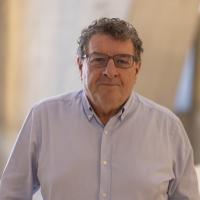The Sound of Dementia
What do you think dementia sounds like and why should we listen to it? In this perspective, musician Mike Hanrahan reflects on this question and Atlantic Fellows for Equity in Brain Health raising their voices in unison to help global efforts to address the exclusion of people with dementia from living their fullest lives.

Singer Aine Holden with the Forget Me Nots choir. Photo by Mark Steadman.
Listen to The Sound of Dementia recording.
The first sound we create is a heartbeat. The first sound we hear is the music of a mother’s breath. Her voice is the comfort melody that sends us to sleep. As we navigate our life path, we develop a surround sound of melodies and words that stir our emotions. Each moment sings its own tune.
Science tells us that we all conduct a kind of regular spring clean of our brains, storing long term memories away in the safety of the neocortex, which is — if I was paying attention in class — the vast outer layer of the brain. It has lots of folds with grooves and ridges called sulci and gyri. You might say we all return to the fold, as it were, as we get older, but this is particularly the case when dementia is in the mix. The neocortex becomes our memory haven. Music, poetry, and the arts are the gateway that takes us there.
I’ve spent the last year with The Global Brain Health Institute at Trinity College Dublin working out how I, as a creative artist from Bohemia, can learn from the world of science and Academia, to develop a better understanding of our brain health. We’ve been exploring meaningful ways of collaboration between science and the arts in dementia care. As part of a cohort of 14 in Trinity, and a further 17 based at UCSF, in San Francisco, we all worked together connecting online and in person: artists, neurologists, food economists, dancers, a film director, clinicians, scientific researchers and singer songwriter me.
We’re all, in our own way, creative artists, inspiring each other to be more inquisitive, more understanding, and more tolerant.
We have in common the goal of breaking down the stigma associated with dementia and poor brain health.
One day I asked my friend Valentine, an eminent Neurologist from Nigeria who sat across from my desk, what is the sound of dementia. “Interesting question,” was his reply. “We study it, we talk about it, we write about it, we photograph it. We follow its development; we treat it with medication and care, but no one asked me that question before Mike.”
So, what do you think Dementia sounds like? And why should we listen to it?
It must be a quiet gentle sound, I think, one that responds easily to our changing emotions. Yes of course, it sometimes loses control, and it may sound angry, sad, or confused. And sometimes, as my friend Kevin explained about his Lewy Body Dementia nightmares, “sometimes it’s absolute hell Mike.” Yes, I wonder what that hell sounds like too. Is it a flattened A minor ninth chord with a diminished fifth over an XYZ bass….? I don’t know, and I have no idea what that chord would sound like either. Although I’d like to figure it out.
I thought about this some more, and eventually composed a base line of melody called The Sound of Dementia. It’s not, as you might suspect, anything like The Sound of Silence. That song was about the inability of people to communicate with each other. But for me, the Sound of Dementia is all about communication. Why, you may ask, what purpose will this sound achieve? I don’t know for sure, but I do know that voices in harmony achieve their best when supporting each other.
My band of scientists and creative artists will soon arrive in Dublin from The Congo, Scotland, Nigeria, The Americas, and Nepal for a gathering at Trinity College to celebrate Creative Brain Week. We will turn up the amps in the neocortex and see where it takes us. Our shared experience will create a shared sound to stir the emotions. We’ll raise our voices in unison to help global efforts to address the exclusion of people with dementia from living their fullest lives.
While the heart still beats, we can continue to hear and enjoy its music, and on our mother’s breath we will remain connected, always.
This piece originally aired on Sunday Miscellany on RTÉ Radio 1. Listen to The Sound of Dementia recording.

Atlantic Fellows Cathy Correa Lopera (Colombia) and Mike Hanrahan (Ireland) during Creative Brain Week 2023. Photo by Paul Sharp, Sharppix.
Authors

Mike Hanrahan
Author, songwriter, musician, performer
GBHI Members Mentioned

Valentine Ucheagwu, PhD
Neuropsychologist


